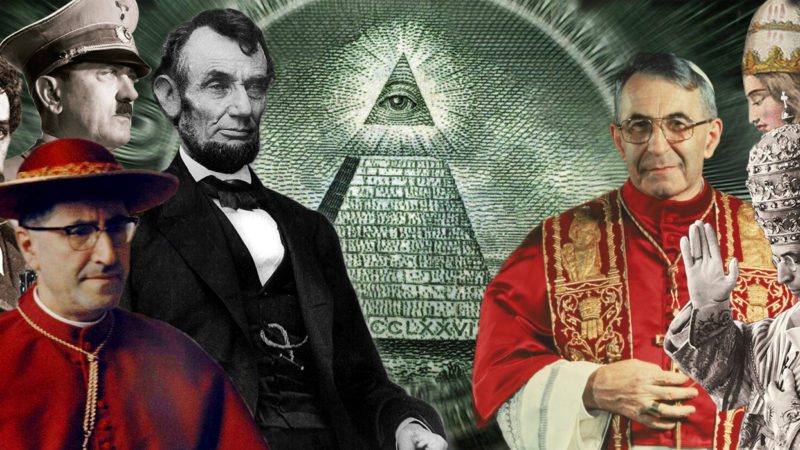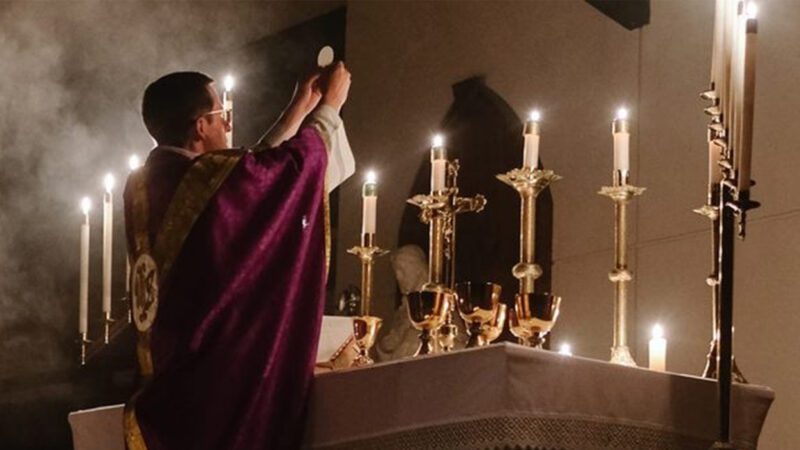In this episode of The Catholic Talk Show, the guys are joined by Fr. Justin Fletcher to discuss why traditional Catholic practices and devotions are so important and which ones should be brought back.
In this episode, you will learn:
• What are Rogation Days?
• What are Ember Days?
• What Is The First Friday Devotion?
• Why Altar Rails make more sense that lines?
• Why don’t Catholics still have meatless Fridays?
• What is the Personal Ordinariate of the Chair of St. Peter?
Show Notes & Links:









Hi guys,
Interesting podcast as we wonder what gets absorbed and what doesn’t when Anglican or Episcopalian members convert to Catholicism. I never even heard of rogation or ember days and it is so nice to learn about other traditions and some that fell by the wayside that could be brought back.
At one point Ryan Scheel you answered a question from Fr. Rich and directed to your guest or Fr. Fletcher. Sometimes you hate to give over the floor. Remember there are others there with you with something to say.
Good point about bringing back meatless Fridays during Lent. I, for one, substituted nothing in place of that particular sacrifice especially since I wasn’t asked to.
I know a lot of people who attend as many daily Masses as they can during the week in addition to Sunday obligation. These people often pray off and on during the course of the day. This is all to keep the devil away and keep our faith strong. The more you think about God the less chances the devil has to attack you.
I am so glad they all humbled you a bit Ryan Scheel by pointing out you were reading the thirteen promises verbatim from your screen.
Fr. Rich that is an interesting suggestion that railings and kneelers be brought back for the Eucharist. I think the opposite from all you guys. I think the process is more organized and goes by quicker as a result of lines. I think they stopped the kneelers because some stayed there longer than others after receiving the host. I remember a backup more often than not. People can always kneel and prayer at other times during Mass and on your own.
Also many families attend Mass and they are carrying their little ones and have other small children with them as well. It is not easy to kneel with a small child and now you have additional children, who may be too young to receive Holy Communion, kneeling in place as well holding up the process and making it less smooth. There were too many clogs and backups and not everyone can kneel either due to arthritis, bad knees, etc. It is not just the older ones who are decrepit. I think the best thing that happened were the standing and moving organized lines. People can genuflect to God and people receiving the Lord either know about the sanctity of the sacrifice of Christ and respect it or don’t. It doesn’t matter if they kneel or stand. It’s what is in their heart not their knees.
Fr. Fletcher mentioning confession made me wonder if people could call their priests to receive confession if they are sick or housebound? Thank you Fr. Fletcher for all you do and you had a lot of interesting things to say!
Another good podcast my thanks to all of you! God bless us everyone as Tiny Tim would say.
Enjoy your show. Good topics.
Bring back the Churching of Women after childbirth as well!
Thank you for another interesting show. I so enjoyed it. Happy to hear that you also miss the Communion rail and kneeling and having the host placed in our mouths. I was fortunate to grow up in the 50’s and 60’s where mass just seemed a bit more sacred- when women wore hats and chapel veils and never wore slacks. I learned while in Medjugorje that woman should always have their shoulders and knees covered. I agree. And Ryan Scheel, I am always in awe of your abundance of knowledge in most things concerning the Catholic religion. You all compliment each other. Great show! Look forward to Tuesdays. Thank you. 🙏🏻❤️
Hi everyone. Thoroughly enjoyed this talk show. It was good to hear your views on Rogation and Ember days as no one here in the U K talks or remembers why these were celebrated. Great to know I’m not the only one who “changes lanes” when going to receive Holy Communion. I have only ever received from a priest and at times have had to walk half way around a cathedral in order to get to a priest. What annoys me more is when children join the communion line and the extra ordinary minister gives a blessing to those too young for communion!! What does that mean? Then we have the altar rail. Yes, yes, yes….bring it back. In our church, on Sundays we have the priest and minister giving the Eucharist and two ministers with the Blood of Christ. When I have asked mentioned that I wish the Altar rail was still in use, the priest says it would take too long!! How come? More people were at mass 40 years ago than now and it was never a problem. As mentioned on the show, I feel the meaning and receiving of communion is lost on most catholics. When they are in the line there is no reverence shown, no state of grace. I feel it has become a habit and the true meaning has disappeared from their minds. After receiving communion many return to their places and just chat to the person next to them. Every so often I feel the priest should give us all a refresher course during his homily to reign us in on all that has been forgotten in our beautiful faith.
I do continue to abstain from eating meat on Fridays but I am of the older generation. Sadly the younger generation do not follow this tradition.
Jackie:
40 years ago there were less people at the altar rail and kneeling. The moving lines are just that moving lines that keep everyone organized and moving along. The fact that they all genuflect and are receiving communion is proof of their belief in the sanctity of the Eucharist.
P.S.
Jackie
What is wrong with children receiving blessings from the priest and realizing that they are in the presence of God?! It takes no time at all for them to participate in the only way they can until they receive the sacrament of Holy Communion. I don’t begrudge anyone getting a blessing from God through his priests.
Andrea, I’m not talking about getting a blessing from the priest, that is fine, but it’s when they go along with or without an adult and it’s the extraordinary minister who is giving out the Eucharist. They are too young to receive holy communion so the Eucharistic minister gives them a blessing!! I just don’t get that
Pray for me, Fathers. I was born and baptised Catholic, but removed from the church and raised anti-Catholic Pentecostal evangelical when I was 4. There is much I love about Catholicism, much that has answered questions Protestantism has brought up in me, and much that I do not understand. Unfortunately, my immediate, extended, and in-law families are rabidly anti-Catholic and I was strongly brought up to be an obedient, compliant person who stays within family boundaries, and who ought to defer family faith to my husband as head of the house. As being protestant does not mean hellfire, why should I cause rifts and divisions, possibly confuse and stumble my children, and overrule my husband’s headship by becoming Catholic?
I am so very torn to pieces on this, and my life made busy and overrun by my family to make Catholic obligations difficult for me. Plus, my husband firmly said I cannot raise our children Catholic. Christian, yes. In the Catholic tradition, no.
I would love Fatherly guidance and counsel on this. I have not bothered my local parish priest because he is already overbooked and overworked. Please at least pray.
Y’all ever going to bring a Protestant on the podcast? You brought a Jew on.
God Bless
I love these. Thank you. So, after this episode, I’m wondering if maybe you guys can help me out. I’m a momma in the thick of reproducing (always nursing or pregnant or both). I desperately want to fast… some… but I know there are biological reasons that our Church and every religion offer exemptions to pregnant and nursing women. One Lenten Friday in my first pregnancy, I remember going crazy with hunger – I had eaten every protein (and all the other good food) short of meat but just had this incessant driving craving for meat. I finally remembered there were exemptions, googled canon law on the topic, sank my teeth into some meaty leftovers, and felt satisfied. So just like, “don’t eat meat or maybe make some other penance on Friday” isn’t very clear and so I don’t do it very well, “fast unless you can’t” is equally unhelpful and unclear to me. I would LOVE to do ember days, but I don’t know how to fast in my current state!! Could you dig into some of the history of what pregnant and nursing women (and maybe laboring men, since they’re stated in the exemption, would include my husband, and historically would have included every man, lol) actually did for fasting and abstinence days? Or do I just have to wait another decade to deny my body in that way? And if so, how do I set example for my children? So, to clarify again, I can ask my pastor or spiritual director for personal counsel, but I’m really curious about history and historical custom here. Thanks!!!